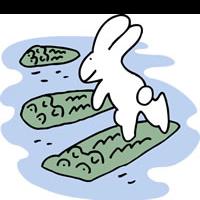いなば の 白 ウサギ
いな ば||しろ|うさぎ
not specified|||
Weißes Kaninchen aus Inaba
Hare of Inaba (Japanese myth)
Lièvre d'Inaba (mythe japonais)
Wit konijn uit Inaba
むかし むかし 、 隠岐 の 島 と いう 小さな 島 に 、 一 匹 の 白 ウサギ が 住んで い ました 。
||おき||しま|||ちいさな|しま||ひと|ひき||しろ|うさぎ||すんで||
Once upon a time, there lived a white rabbit on a small island called Oki (Oki → Shimane).
曾几何时,一只白色的兔子生活在一个叫做Oki岛的小岛上(Oki→岛根县)。
ウサギ は 毎日 浜辺 に 出て は 、 海 の 向こう に 見える 大きな 陸地 に 行き たい と 思って い ました 。
うさぎ||まいにち|はまべ||でて||うみ||むこう||みえる|おおきな|りくち||いき|||おもって||
||||||topic marker|||||||land|||||||
Rabbits wanted to go out to the beach every day and go to the big land that they could see over the sea.
Кролики хотели каждый день выходить на пляж и выходить на большую землю, которую они могли видеть над морем.
ある 日 の 事 、 良い 事 を 思い ついた 白 ウサギ は 、 海 の サメ に 言い ました 。
|ひ||こと|よい|こと||おもい||しろ|うさぎ||うみ||さめ||いい|
One day, the white rabbit had a good idea and told the sharks in the sea.
Однажды Белый Кролик, который придумал хорошую вещь, сказал акуле в море.
「 サメ くん 、 ぼく の 仲間 と 君 の 仲間 と 、 どちら が 多い か 比べ っこ を しよう 。
さめ||||なかま||きみ||なかま||||おおい||くらべ|||
"Shark-kun, let's compare my companion and your companion, which is more.
“鲨鱼,我们来比较一下我的朋友和你的朋友,看看谁多。
君 たち は 向こう岸 まで 海 の 上 を 並んで くれ 。
きみ|||むこうぎし||うみ||うえ||ならんで|
|||||||||side by side|
You guys line up on the sea to the other side.
ぼく は その 上 を 数え ながら 飛んで いく から 」
|||うえ||かぞえ||とんで||
I'm going to fly above it and keep counting."
「 いい よ 」 お人好しの サメ は 、 白 ウサギ の 言う 通り に 向こう岸 まで 並び ました 。
||おひとよしの|さめ||しろ|うさぎ||いう|とおり||むこうぎし||ならび|
|||shark|||||||||||
The good-natured shark did as the white rabbit asked and lined up across the river.
「 じゃあ 、 始める よ 。ひと つ 、 ふた つ 、 みっ つ ・・・」 白 ウサギ は サメ の 上 を ジャンプ し ながら 、 向こう岸 まで 渡り ました 。
|はじめる||||||||しろ|うさぎ||さめ||うえ||じゃんぷ|||むこうぎし||わたり|
|||||||||||||||||||||crossed|
One, two, three..." The white rabbit jumps over the shark and crosses to the other side.
「 や ー い 、 だまさ れた な 。比べ っこ なんて うそ だ よ 。
|-|||||くらべ|||||
|||deceived||||||||
"Hey, you cheated me. You're lying about the comparison.
お人好しの サメ くん 。
おひとよしの|さめ|
You gullible shark.
ぼく は こっち に 渡り たかった だけ な の さ 」
||||わたり|||||
I just wanted to cross over here."
それ を 聞いた サメ は 怒って ウサギ を つかまえる と 、 ウサギ の 皮 を はいで しまい ました 。
||きいた|さめ||いかって|うさぎ||||うさぎ||かわ||||
||||||||catching||||skin||||
Hearing this, the shark angrily grabbed the rabbit and peeled its skin off.
「 う ぇ ー ん 、 痛い よ !」
||-||いたい|
"Ummm, it hurts!
皮 を はがさ れた ウサギ が 泣いて いる と 、 若い 神さま たち が そこ を 通り かかり 、 「 海水 を あびて 、 太陽 と 風 に あたる と いい よ 」 と 、 言い ました 。
かわ||||うさぎ||ないて|||わかい|かみさま|||||とおり||かいすい|||たいよう||かぜ|||||||いい|
|||||||||||||||||seawater||soaked with|||||||||||
As the skinned rabbit cried, the young gods passed by and said, "Take a dip in the sea water and enjoy the sun and the wind.
ウサギ が 教え られた 通り 海水 を あびる と 、 ますます 痛く なり ました 。
うさぎ||おしえ||とおり|かいすい|||||いたく||
As the rabbit was taught, it became more and more painful when it was exposed to seawater.
そして 太陽 と 風 に 当てる と 、 さらに もっと 痛く なり ました 。
|たいよう||かぜ||あてる||||いたく||
And the sun and wind made it hurt even more.
そこ へ 、 大 荷物 を 持った 神さま が やってき ました 。
||だい|にもつ||もった|かみさま|||
Then God arrived with a large package.
その 神さま は 、 意地悪な 兄さん たち に 荷物 を 全部 持た さ れて いた ので 、 遅れて やってきた のです 。
|かみさま||いじわるな|にいさん|||にもつ||ぜんぶ|もた|||||おくれて||
The god came late because his mean brothers had all their luggage with them.
「 かわいそうに 、 まず 池 に 入って 、 体 の 塩気 を 良く 洗う んだ 。それ から 、 がま の 穂 を ほぐして その 上 に 寝 転がれば いい よ 」
||いけ||はいって|からだ||しおけ||よく|あらう||||||ほ||||うえ||ね|ころがれば||
||pond||||||||wash|||||||||||||||
"Armes Ding, zuerst musst du in den Teich gehen und dir das Salz vom Körper waschen. Dann kannst du die Ohren der Rohrkolben abwickeln und dich darauf legen."
Poor thing, first you need to get in the pond and wash the salt off your body. Then you can unwind the ears of the cattails and lie down on them.
ウサギ が その 通り に する と 、 やがて 痛み も 消えて 、 全身 に 元どおりの 毛 が 生えて き ました 。
うさぎ|||とおり|||||いたみ||きえて|ぜんしん||もとどおりの|け||はえて||
The rabbit did as he was told, and soon the pain disappeared and all of his fur grew back.
この 心 やさしい 神さま は 、 のち に オオクニヌシノミコト と 呼ば れ 、 人々 に うやまわ れた そうです 。
|こころ||かみさま||||||よば||ひとびと||||そう です
|||||||||||||was revered||
This kind-hearted god was later called Okuninushi no Mikoto, and was revered by the people.
おしまい

